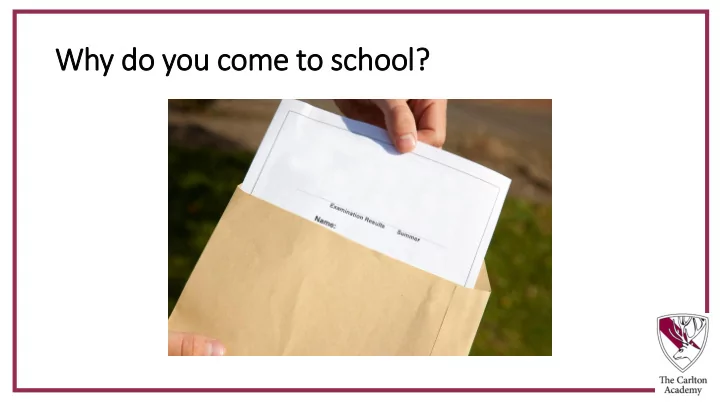

Why do you come to school?
Why is is homework im important? • Re-inforce skills and knowledge • Opportunity for prep work • Helps you to become an independent learner • Self-motivation • Organisation skills • Time-management skills
What does the research say?
Keystage 3 homework strategy • Every Year 7 and Year 8 student will get a homework booklet, prep book and folder • 30 minute homework tasks. Weekly for English, Maths and Science. Fortnightly for all other subjects • You choose the task (unless directed otherwise) • Work completed in the prep book • Signed at home when each piece of work is completed
Normal rules for presentatio ion apply • Writing in blue or black ink • Drawing in pencil • Put a date and title on each piece of work • Underline the date and title using a ruler
Activ ivities • Red pen, black pen • Questions and answers • Revision clocks • Flash cards • A5 revision cards • Text to pictures • Languages practice • Emphasis on self-quizzing
Red pen, bla lack pen • Study a section of your knowledge organiser and try to remember it. • Cover the knowledge organiser and write what you can remember in your prep book in blue or black pen. • Check your knowledge organiser and add anything that you had forgotten in red pen. • Repeat with a different section of the knowledge organiser.
Questions and answers • Use your knowledge organiser to write a list of questions in your prep book. • Cover your knowledge organiser and write the answers in your prep book. • Check your answers and correct any that you got wrong.
Revis ision clo locks • Study a section of your knowledge organiser and try to remember it. • Cover the knowledge organiser and write what you can remember in the first section of your revision clock. • Check your knowledge organiser and add anything that you had forgotten. • Repeat with a different section of the knowledge organiser.
Fla lashcards • Study a section of your knowledge organiser and try to remember it. • Cover the knowledge organiser and write what you can remember on to a flashcard. • Check your knowledge organiser and add anything that you had forgotten. • You can give the flashcards to an adult so that they can quiz you.
A5 revis isio ion cards • Study a section of your knowledge organiser and try to remember it. • Cover the knowledge organiser and write what you can remember into a section of the diagram. • Check your knowledge organiser and add anything that you had forgotten.
Text xt to pictures • Study a section of your knowledge organiser and draw pictures/diagrams to help you to remember what you are reading, on a piece of paper. • Cover the knowledge organiser and, using only your diagrams as prompts, write what you can remember in your prep book. • Check your knowledge organiser and add anything that you had forgotten.
Languages practice • For French and Spanish you should use your knowledge organisers to write sentences using key vocabulary. • Use the sentence structures and vocabulary lists provided. • Practice the sentences with a family member or a friend.
Week beginning 7 January 2019 (week 1) Subject Day completed Signed (home) English Maths Science Geography Philosophy, religion and ethics Art Drama IT Spanish Signed (school)
How wil ill your homework be checked? • In tutor time during equipment checks • Tutors will sign the week overview to say that an adequate amount of work has been completed • Tutors will check and comment on standard of presentation • Your work will not marked for content by tutors
How wil ill your homework be checked? • Quizzing in lessons • Teachers will be able to tell if you are doing your homework effectively
Detentio ions for not doing homework • Set by tutor • One hour long • One homework detention per night. Each house on a different night • Identify and deal with repeat offenders • Homework club to support students who want help
Lost booklets and prep books • Students buy a replacement booklet, prep book and folder • £3 • Or can print their own booklet from the school website • Identify and deal with repeat offenders
Keystage 3 homework strategy • Clarity about the amount of homework • Clarity about the tasks • Meaningful tasks • More time in lessons to focus on application of skills and creative learning • Learning revision skills • Developing independent learners
Recommend
More recommend